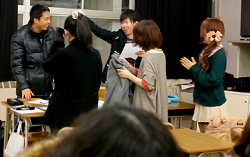Adult Learning and Development
![]() Exploring disparate philosophies and applications of adult education practice can help identify principles for more effectively facilitating perpetual learning that benefits adult learners and society. Emerging research shows that adults have an amazing capacity to learn at all stages of life and that adult education practice provides a broad array of possibilities for enriching individuals' lives while meeting society's needs.
Exploring disparate philosophies and applications of adult education practice can help identify principles for more effectively facilitating perpetual learning that benefits adult learners and society. Emerging research shows that adults have an amazing capacity to learn at all stages of life and that adult education practice provides a broad array of possibilities for enriching individuals' lives while meeting society's needs.
No single approach or theory seems to address the diverse abilities and needs of adult learners adequately, the multiple missions of institutions, and the changing needs of society. Rather than imposing myopic philosophy and ideology, adult educators can be more effective by adapting practice to the dynamically interacting needs of the student and the environment.
- Details
- Written by Brent A Duncan, PhD
As the adult education field matures, professional associations have established best practices [1, pp. 39-41] to guide members. In analyzing the guidelines of various groups, Maehl found the following major commonalities that associations hold for adult education:
- Details
- Written by Brent A Duncan, PhD
Given the disparate needs of individual adult learners, the multiple missions of learning programs, the changing needs of organizations and society, and the dynamic environment of markets, no single approach to adult education can be considered the best. However, Maehl [1] asserts that his three-year analysis of adult education programs has uncovered practices that may prove successful in a wide range of circumstances.
- Details
- Written by Brent A Duncan, PhD
Exploring disparate philosophies and applications of adult education practice illuminates principles that can contribute to effective adult education practice to facilitate lifelong learning. However, only one thing seems clear: no single approach alone adequately addresses the diverse abilities of individual learners, the multiple missions of institutions, the changing needs of society, and the dynamic environment of markets and cultures.
- Details
- Written by Brent A Duncan, PhD
Particularly important for adult learners, neuroscience demonstrates that theorists like Freud, Piaget, and Erikson were wrong when they concluded that adulthood marked the end of development and the beginning of decline to death. Contrarily, Cohen (2006) argues that neurology shows how adulthood is a "time of new possibility" with immense potential to nurture. Cohen said, "It's time we stopped dismissing middle age as the beginning of the end… At 40, the brain's best years are still ahead" (p. 82). Cohen's assertion does not seem to be "feel good" optimism for fogies; he bases his conclusions on a growing amount of evidence from neuroscientists.


![Adulthood is a time of new possibility with immense potential to nurture. [Image: Copilot] Adulthood is a time of new possibility with immense potential to nurture. [Image: Copilot]](/images/Images/best-years-for-adult-brain300.png)



